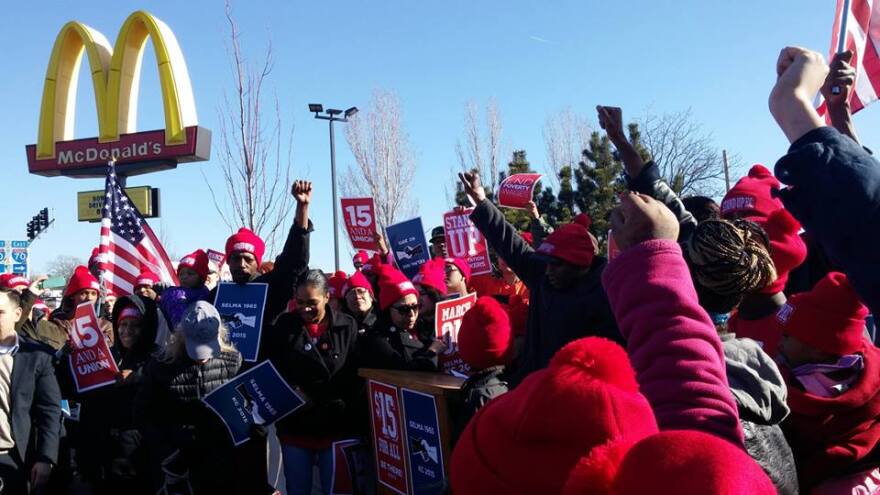The Kansas City Council is poised to take action Thursday on an ordinance that would raise the city's minimum wage well above state levels.
For the past several years, it's become more commonplace to see groups of protesters and low-wage workers from Stand Up KC rallying in bright red shirts outside fast-food restaurants.
Stand Up is part of a broader national push for a $15-an-hour minimum wage and union representation for workers. For the past week, they've camped outside City Hall to show their support for the pending ordinance.
Dana Whitman is a Subway worker who has protested for two years now. She's one of dozens who say Missouri's $7.65 hourly minimum wage simply isn't enough to live on.
"I'm bouncing between places, so I don't get to save up anything to have my own," Whitman said. "I have to spend all my money either paying my aunt to live [with her] or putting food in my boyfriend's house."
Whitman and the other protesters say that $15 an hour would help get them off public assistance and become financially independent. When it was first introduced, the ordinance called for a $15 hourly wage by 2020. Now, the latest substitute draft reels that back to $8.50 an hour this year, and $13 an hour by 2023.

Mayor Sly James said the issue has been difficult from the beginning.
"Everything about this is tough," James said. "What's the right number? What impact will it really have on businesses and employees? At what point does a business close down? We don't have the answers to those things."
For some though, a big minimum-wage increase spells hardship for business. Bud Nicol of the Hotel & Lodging Association of Greater Kansas City says there's no doubt among the hotel and restaurant industries that they'll suffer if the council adopts a large hike.
"If this happens in Kansas City, Missouri, what's going to stop business from relocating to Riverside, to North Kansas City, to Kansas?" Nicol said. "If you do a drastic increase, then some of the workers who are already making good money will end up not getting a raise because businesses will not be able to do the longevity raises that they typically do."
Nicol says he knows of two hotel developers who were interested in building new hotels in Kansas City who are now putting their plans on hold because of the minimum wage debate.
But there are some who say these fears aren't real. University of Missouri-Kansas City economics professor Linwood Tauheed says opponents to minimum-wage increases often cite studies that assume a wage increase will lead to higher prices for goods and higher unemployment.
But Tauheed says a study by two Princeton economists on New Jersey's minimum-wage increase from $4.25 to $5.05 an hour in 1992 shows that a higher wage won't derail the local economy.
"There was no effect on employment or unemployment in New Jersey as a result of them increasing their minimum wage before Pennsylvania," Tauheed said. "And there have been lots of other studies of that type since then, and they've invariably found that there is no effect."
Tauheed did say that the price of goods would likely go up if the minimum wage was increase, but that the difference could be offset by better business practices focused on reducing employee turnover and increasing efficiency.
And though he supports raising the minimum wage significantly, Tauheed worries that a modest increase wouldn't make a significant impact on low-wage worker income, but would put workers above a cap that would end up disqualifying them for SNAP benefits and child care tax credits.
"You know, if they had a $100 increase in their [weekly] wages and a $120 decrease in their food stamps, would they still be for it?" Tauheed said. "And I would imagine that if they were asked in that way, they'd say, 'No, I need at least a $120 increase in my wages.'"

While there is little agreement on what an increase could mean for Kansas City's economy and low-wage workers, there's even less agreement about a powerful obstacle: Missouri state law.
City Councilman Ed Ford says that, historically, minimum-wage increases have seen pushback from the state.
"The state Legislature has passed a statue that says, 'No city shall enact a minimum wage,'" Ford said. "That was done a number of years ago."
But in 2002, the Missouri Supreme Court dismissed a challenge to a living wage ordinance in St. Louis that gives public employees a higher wage. And a bill sponsored by Rep. Dan Shaul, a Republican from Imperial, Missouri, that would have prohibited cities from raising the minimum wage on their own was vetoed by Gov. Jay Nixon last week.
Shaul says if Kansas City raises the wage, the issue will likely go to Missouri district court, and potentially the state Supreme Court. And even though he stands by his bill's ban on local minimum-wage ordinances, Shaul says the Legislature or ballot initiatives could take the lead on raising wages in 2016.
"I think we'll probably see something on the ballot in 2016 if the General Assembly fails to react to raising the minimum wage or adjusting it in some way," Shaul said. "I think it's very important to leave the minimum wage up to the state."
The Kansas City Council has vowed to take action on the minimum wage during its session Thursday.




